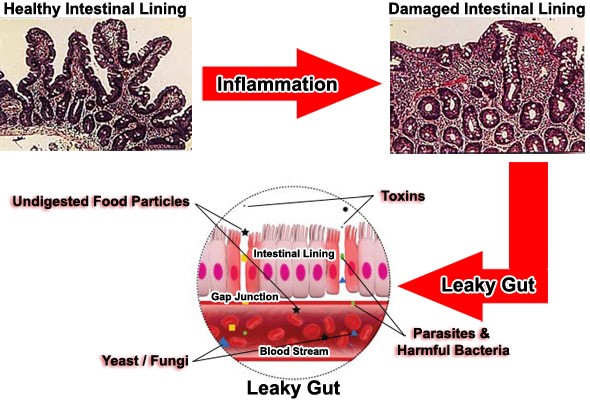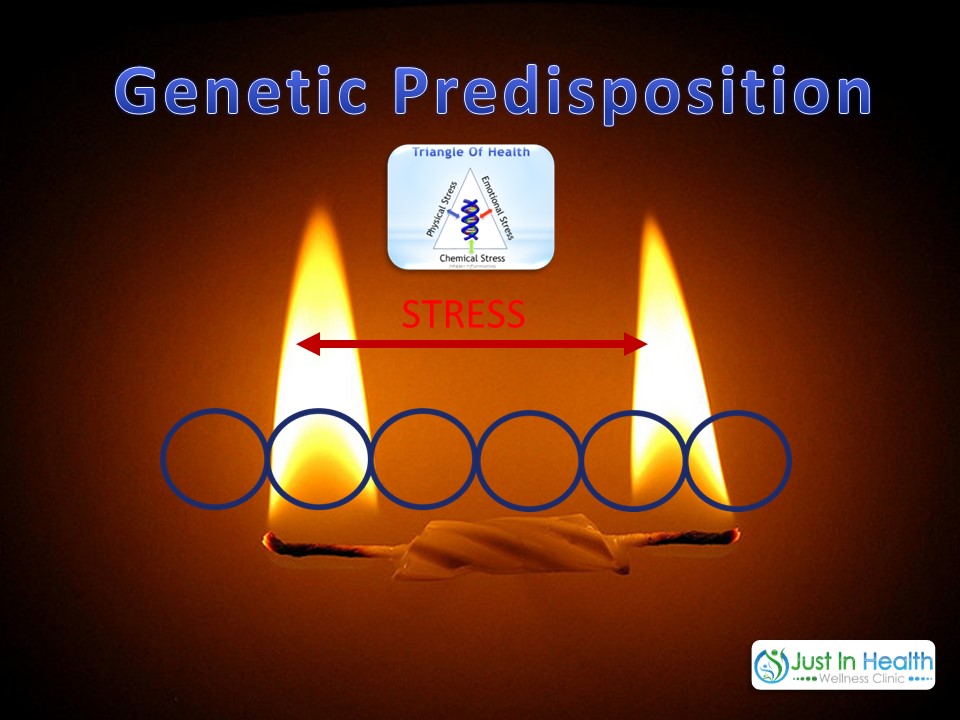
By Dr. Justin Marchegiani
Leaky gut syndrome (gastrointestinal permeability) is a phenomenon that occurs within the intestinal tract where the epithelium tissue's tight junctions open slightly, allowing undigested food particles and potential bacteria (endotoxin) to make its way into the bloodstream. These compounds are typically only found in the gut, so our immune system goes on high alert when it starts seeing new and unusual things. Our immune system reacts by creating various immune cells called antibodies to inspect what’s going on (and potentially attack)! These antibodies are equivalent to our navy, marine corps, air force, and army; their job is to tag these various particles for destruction. When our immune system attacks some of these foreign proteins (antigens), various organs can get caught up in the scuffle. This accidental tagging is a case of mistaken identity, or the scientific term molecular mimicry.

There are amino acid sequences on these antigens (foreign particles) that are similar to other tissues in the body. Our immune system reads these antigens by the sequence of its surface proteins. It’s kind of like getting pulled over by a policeman that is out looking for a similar make and model of the car you drive because a suspected criminal was seen driving the same car earlier that day. Foods like gluten can easily cause your immune system to start attacking the thyroid gland, brain, intestinal tract (celiac, Crohn’s, ulcerative colitis), or other nervous-system tissue based on similarity and genetic predisposition. There’s a good deal of research showing that autoimmune disease cannot occur without a leaky gut. This is why people with a chronic illness need to have their gut checked. Click here to get your gut checked!
When these proteins have a similar shape to other proteins, cross-reactivity can occur. These proteins have the ability to bind into other receptor sites, just like with casein and gluten. As you can see by the picture below, the shape of the antigen can be enough to confuse the immune system.
Foods containing things like casein from dairy products can cause the immune system to start attacking the pancreas. Casein can also cross-react with gluten too! Cross-reaction is where the immune system starts responding to other proteins as if they are gluten. This is the reason why some people who only remove some grains from their diet may not recover fully. The consumption of other cross-reactive foods outside of gluten can be enough to prevent your thyroid from healing.
Wherever the weak link in your genetic chain is, may be the deciding factor regarding what autoimmune condition you express. The tighter you pull your genetic chain, the increased chance those weak links will be exposed and break. The tightness is equivalent to the stress in your life, while the weak link is symbolic of your genetic susceptibility.

Some people may get Hashimoto’s (autoimmune thyroid condition) while others may develop multiple sclerosis or Parkinson’s disease. There tends to be a genetic link regarding what condition you may express. If Parkinson’s or Hashimoto’s runs in your family, this may be a good indicator of what you are predisposed for.
Genetic predisposition is not a death sentence but merely a strong warning you need to heed. I personally have an autoimmune thyroid condition and also have many other autoimmune conditions that run in my family. Because of this, I pay close attention to my diet, emotional stress, physical stress, and chemical stress. The stressors, or allostatic load, in your life have a huge impact on your epigenetics. Your epigenetics control what genes your body expresses, kind of like turning a light switch on or off. So in other words, you have the ability to control what genes you express or don’t express.
So if you have a predisposition toward chronic degenerative autoimmune conditions, it’s really important that you develop other healthy habits that keep those genes from expressing themselves. The more our immune system is fired up, the more inflammation occurs in our body. The additional inflammation and undigested food proteins put additional stress on our detoxification system, causing our liver to have to work harder to filter out all those extra antigens and toxins in our blood stream.
Inflammation is the underlying cause of leaky gut. Below I will talk more specifically about what the underlying drivers of inflammation are.
All grains, especially gluten-containing grains, such as wheat, barley, rye, oats, spelt, and Kamut, can be hyperallergenic. Other foods can also cross-react with gluten, such as dairy products (especially milk products that are higher in casein) and legumes (soy, beans, and peanuts). Butter, heavy whipping cream, and ghee tend to be OK. Some people who are autoimmune need to avoid everything but ghee. Many of these allergens tend to be a little controversial.
Most people think of allergies as the kinds that close up your throat, like when someone who has a peanut allergy eats peanuts. That type of allergy is known as an IgE-mediated immune response, or in the above peanut example, an anaphylactic response. We tend to know about these allergens in childhood because of some type of traumatic experience that may have included a blocked airway, itching, and/or hives. The allergenic response I am talking about comes from a different part of the immune system. Essentially, a low-grade inflammation that occurs because of a cross-reactivity or an IgA–, an IgG–, or a T-cell–mediated immune response. These types of immune responses can cause leaky gut and contribute to thyroid imbalances, adrenal fatigue, brain fog, weight gain, and other digestive symptoms.
We need HCl, or stomach acid, to help break down our proteins and ionize minerals. If we don’t have enough stomach acid, we can’t break down and absorb zinc. If we don’t have enough zinc, this can affect our immune system, sex hormones, and our ability to make stomach acid. As you can see, a downward spiral is occurring that causes our body to break down even faster with no end in sight!
With inadequate stomach acid, we are also prone to gut infections (bacterial, parasitic, fungal, and viral) and small intestinal bacterial overgrowth (SIBO). Many of these infections produce biotoxins/endotoxins that can affect hormone metabolism and nutrient absorption and can contribute to fatigue of the thyroid and adrenal glands. Chronic infections tend to play a role with autoimmune conditions as well as leaky gut.
When getting to the bottom of leaky gut, it’s essential to incorporate a 5R program (remove, replace, repair, remove, and reinoculate). Just like baking a cake, the order in which things are done is very important to making the recipe tasting great. Just like when addressing chronic leaky gut autoimmune conditions, the order and how we address the underlying cause is important to preventing relapse as well as to feeling as good as you possibly can during the process. Again, I want to stress that it’s very important to address underlying hormonal imbalances, including adrenal, thyroid, and female hormone issues, before getting to the chronic infection.
I personally find that patients will fall apart during the treatment if this isn’t done. This is dependent on how long the person is sick and how sick the person is, and there are exceptions to every rule. If the person's hormonal system is not supported adequately when removing the infection, the chance of a die-off reaction is higher. Die-off reactions may feel something like fatigue, headache, nausea, and/or chills. Some people may notice nothing when the infection is being removed while others may have significant die-off reaction symptoms. There are various techniques and herbal medicines that can mitigate die-off or Herxheimer reactions.
This part's pretty simple. Remove the foods that are creating inflammation. Some people may need to be on a stricter autoimmune Paleo type of diet. Some may need to remove FODMAPs (a group of carbohydrates the small intestine has trouble absorbing). For others, a clean Paleo diet may be enough. An elimination provocation diet is the easiest way to be specific and avoid expensive and sometimes unnecessary allergy testing.
People with chronic stress can have low stomach acid. When there’s low stomach acid, there is typically low enzyme and bile salt production as well. It’s always good to work up to a patient's stomach-acid tolerance so we can ensure the patient is breaking down proteins, fats, and minerals optimally. We need to make sure the building blocks are present, broken down, and absorbed so the person can heal.
Depending on how stressed or inflamed a patient is, adding additional healing and/or soothing nutrients can be helpful. Sometimes just making the above changes is enough to help facilitate healing. Others may need additional compounds, such as L-glutamine, slippery elm, zinc, aloe vera, and deglycerized licorice.
This is the place where we remove the infection. As you can see, the infection is one of the last things we address. This helps prevent die-off reactions from overwhelming the detoxification system, immune system, and lymphatic system. I find that removing the infection at the end tends to be the most effective.
This is where we add the probiotics back in. Many people have a dysbiosis (or SIBO) in the gastrointestinal tract. This is when there is an overwhelming amount of bad bacteria in relationship to good bacteria. Adding in probiotics when there is a high amount of bad bacteria can cause problems, such as gas, bloating, and gastrointestinal pain. Removing the infections and bad bacteria first, allows the good bacteria to flourish. The analogy is weeding the garden before you plant the seeds—you never put seeds into a garden full of weeds.
Chronic infections can encase themselves in the slime known as biofilms. These biofilms are resistant to antibiotics; therefore, the conventional approach to treating these infections tends to not be as successful. Working with a skilled functional-medicine doctor that can combine the right antimicrobial herbs for your infection with some well-known biofilm busters is an important ingredient to removing the infection in the long run.
If you’re suffering from an autoimmune condition, fatigue, digestive problems, and/or hormonal imbalances, there is a good chance that leaky gut is playing a part. If you want to take a closer look into what’s causing your health issues, feel free to click here for a complimentary consultation.